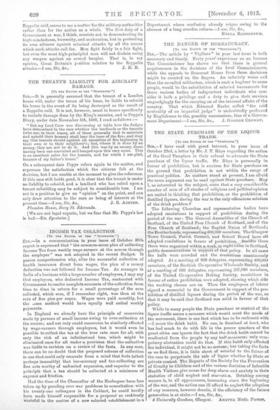THE STATE PURCHASE OF THE LIQUOR TRADE.
[To TUE EDITOR 07 THE " SPECTATOR."]
have read with great interests in your issue of October 23rd, a letter by Mr. J. T. Rbys regarding the action of the Good Templars in their refusal to advocate the State purchase of the liquor traffic. Mr. Rhys is personally in favour of prohibition, but is anxious for State purchase on the ground that prohibition is not within the range of practical politics. As matters stand at present, I am afraid the same argument can be used against State purchase. May I, as interested in the subject, state that a very considerable number of men of all shades of religious and political opinion are united in thinking that prohibition, or the prohibition of distilled liquors, during the war is the only efficacious solution of the drink problem
The following Churches and representative bodies have adopted resolutions in support of prohibition during the period of the war : The General Assemblies of the Church of Scotland, of the United Free Church of Scotland, and of the Free Church of Scotland; the Baptist Union or Scotland; the Brotherhoods, representing 600,000 members. The Glasgow Town Council, Parish Council, and School Board have all adopted resolutions in favour of prohibition. Besides these there were organized within a week, in eight cities in Scotland, public demonstrations in support of that policy. In all eases the halls were crowded and the resolutions unanimously adopted. Aka meeting of 800 delegates, representing 400,000 members, of the Scottish Co-operative Wholesale Society, and at a meeting of 680 delegates, representing 207,000 members, of the United Co-operative Baking Society, resolutions in favour of entire prohibition were adopted, skewing which side the working classes are on. Then the employers of labour signed a memorial to the Government in support of tho pro. hibition of distilled liquors during the period of the war, so that it may be said that Scotland was solid in favour of that policy.
While to many people the State purchase or control of the liquor traffic seems a measure which would meet the needs of the movement, there is one fact which has to be reckoned with —I mean the drink habit. No one, in Scotland at least, who has had much to do with life in the poorer quarters of the great cities can ignore the fact that the drink habit cannot be eradicated from the people by any half-measures; only cons. pulsory abstention could do that. If this habit only affected the individual, it might not be so serious; but taking the facts as we find them, it is little short of suicidal to the future of the race to perpetuate the sale of liquor whether by State or private control. The Reports of the Society for the Prevention of Cruelty to Children and of the various Societies of Infantile Health Visitors give cause for deep alarm and anxiety in their statistics of child neglect and starvation. Drinking among women is, to all appearances, increasing since the beginning of the war, and the nation can ill afford to neglect the adoption of any measure, however drastic, if the efficiency of the future generation is at stake.—I am, Sir, Suie 4 University Gardens, Glasgow. AGATHA. NaL
















































 Previous page
Previous page